
The thinking and analyses of benchmarking continues to dominate hotelier discussion, and the industry’s most nimble minds are not satisfied the terminology, emphasis and focus have reached any type of apex. MANCHESTER, England—Hoteliers are in no doubt benchmarking has been one of the major, if not the most major, catalysts of the last decade helping fuel hotel performance, and the data is only getting better and more involved, according to sources. Now hoteliers are considering how benchmarking might change as the industry reaches what many consider the end of a cycle. Speakers on a panel at the recent Annual Hotel Conference titled “Sitting on the bench or pressing it” indicated one goal is the analyses of rooms benchmarking, not just around the primary sale, but all the way through the profit and loss account. That changes depending on the operating business model, sources said. “At the core is the transparency of data, and doing something with it. It is output rather than the input,” said Jonathan Walker, managing director of the 40-room No. 15 Great Pulteney in Bath, England, and a former director of hotel performance and operations support, Europe, at InterContinental Hotels Group. “It is not cash from benchmarking, but the cash you are missing if you do not have it, and the ability to articulate that to stakeholders,” said Kym Kapadia, chief commercial officer at Aprirose Real Estate Investment, which in 2017 bought from Bain Capital the 26-asset QHotel portfolio for £525 million (at the time equivalent to $706 million). “We’re seeing a shift in relevance of the historic data. It is now about looking ahead, monitoring pick-up and pace and about the business on the books,” said Steven Cote, product manager at Forward STAR, a division of STR, the parent company of Hotel News Now. Nick Turner, managing director at Owners Management Group International, a hotel-management company in the lifestyle and boutique space, said even more importance has to be placed on getting the competitive set right. “Otherwise it is rubbish in and rubbish out. It has to be right on an asset-by-asset basis, and it starts with the right comp set,” Turner said. “No one understands the business better than the GM on the ground, and it takes analysis and experience and talking to people,” he added. Sources said hoteliers now are focused on analyses of revenue-generation indices, comparing individual revenue per available room with that of the comp set and seeing how that metric changes for individual hotels when the market changes. Kapadia said keeping on top of the numbers has changed enormously as the number and range of stakeholders have increased. “It can be subjective in terms of the numbers of layers of ownerships and their opinion, and you have to look at the unemotional numbers,” she said. She said hoteliers still need to understand what they are and where they want to go before they get deep into the arithmetic. “Learn from best in class and overtake them, and remember there always are a cycle and an exit,” Kapadia said. “It is so important to have feasibility on any acquisition and investment. Yes, the forward-looking data is huge for the cycle, business plan and exit. Who knows, but with some insight and rationality, you’ll have a good guess.” Hoteliers who are not part of large portfolios or multi-brand platforms still are being nimble in what data they want and how to get it. “You have to have a vision as to where the product will be pitched,” Walker said. “We do a lot of research on product we might not know. We look at location, style, size, the obvious things, but also a few extra things … the quality side, being aware and curious as to what else is happening in your market.” Unlocking potential Hoteliers need to keep up to date, as third parties certainly are doing so, Walker said. “Last year, we were looking to open a hotel in Bristol, and we had a really awkward two-hour meeting, as (the other party) knew far more than we did. Benchmarking has to be ingrained, as a deal will only be passed to the bank if all the steps are passed,” he said. Cote said third-party collaboration of data and aggregating portfolios against one can provide more comfortability. One problem with performance data is the obsession with RevPAR. “All is more advanced in the rooms product. There is a need to be more clever in the rest of the building,” Aprirose’s Kapadia said. Cote said taking meaningful information from net RevPAR, with distribution costs subtracted from rooms revenue, is difficult in a country such as the United Kingdom, where “about 70% of revenue comes in from rooms … and there is no definite statement as to what net RevPAR is.” The meaning of net RevPAR also needs standardization, Cote said. “You have to have a benchmark, which is why it is currently more blurry due to the variation of definitions. Someone has to take a stance. After all, someone must have come up with RevPAR? I do not know who or when that happened?” Kapadia said. Turner added the industry has to continue to be supportive of the data and the terminology of it, and that thinking has to be adopted by universities and hotel schools. Walker said he does not believe the franchise model will change quickly because it remains very focused on RevPAR. Paralysis Sources also said there is a danger of “analysis paralysis” due to there being perhaps too many tools to look at. “Who is to say we should at any time be happy with our current state? And then how do we turn it into an actionable strategy, especially when you have multiple stakeholders to talk to?” Kapadia added. Owners Management Group International’s Turner, who also manages the Laura Ashley hotel and tearoom brand, said metrics on leisure clubs—membership rates, attrition, cost of acquisitions—and F&B remain in their infancy, if they exist at all. He added one shortcoming is that this operational excellence often comes at the expense of creativity and communicating with customers. “A broad view is necessary, on consumer data not historical,” Turner said. “I know what is good or not good for my business. It’s easy to look at the stats and the relevant costs, but it is not good enough only to look at the lowest costs. (One also must look at) the quality and what is right for the guest,” No. 15 Great Pulteney’s Walker said.
Create: Dec 3, 2019 Edit: Dec 3, 2019 International News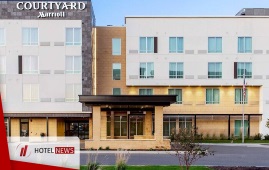
Vancouver-based REIT American Hotel Income Properties completed its sale of 45 economy assets and agreed to purchase 12 premium-branded ones. The move aligns the company’s structure closer to U.S. REITs and better presents itself to investors, executives said. VANCOUVER, British Columbia—Canadian real estate investment fund American Hotel Income Properties on 28 November agreed to acquire a portfolio of 12 premium-branded hotels in the U.S. for $191 million. The move sees the Vancouver-based AHIP move further up the segment ladder and concentrate on higher margins and yielding. With this announcement, the company also said it closed its previously announced sale of a 45-hotel economy portfolio to an affiliate of Vukota Capital Management for total gross proceeds of $215.5 million. The latest deal caps off a period of restructuring for AHIP. In April 2018, the company transferred management of all of its portfolio, at the time 115 hotels, to Texas-based Aimbridge Hospitality, as part of its strategy to become a pure owner. Then in July 2019, AHIP agreed to the deal with VCM. The VCM deal, which closed on 28 November, saw AHIP exit the economy segment and funded its latest acquisition, which comprises 12 hotels and 1,203 rooms in the U.S., in Michigan, Minnesota, North Dakota, Pennsylvania and Texas. The largest hotel by room count is the 120-room Courtyard St. Paul Woodbury in Minneapolis. Seven assets are managed by Marriott International, four by Hilton and one by InterContinental Hotels & Resorts. Aimbridge merged with Interstate Hotels & Resorts on 25 October, although between the AHIP-Aimbridge deal and the Aimbridge-Interstate merger, AHIP renegotiated its management-fee structure with Aimbridge. In an investor update released in coordination with the agreed-to buy and completed sale, AHIP said the new management-fee structure will “strengthen (its) margins, cash flow and growth potential over the next several years.” Expected to close by the end of the month, the 12-hotel buy now gives AHIP 79 assets and 8,887 rooms in its premium-brand portfolio. Jamie Kokoska, AHIP’s director of investor relations, said the completion of the sale of its 45 economy hotels alongside its new acquisition has transformed AHIP into a “pure-play” premium-branded hotel company. The 12 hotels have been acquired at an “approximate 8% capitalization rate” and, with all built in the last five years, at below replacement cost, she said. “By selling our economy-lodging portfolio, our business has become more streamlined and efficient and allows us to focus solely on driving growth from our growing portfolio of premium-branded hotels,” Kokoska said. “We believe these transactions will also better align our company with other publicly traded U.S. hotel REITs and hopefully make our business more easy to understand for investors. Ultimately, we hope our trading multiples will more similarly reflect those of the broader hotel REIT sector,” she said. Segment shift AHIP CEO John O’Neill said in the news release announcing the deal that the “mostly all-suite” deal is the final chapter that completes “a significant component of our 2019 capital recycling program.” Kokoska said Aimbridge will likewise manage the new portfolio. Troy MacLean, equity research analyst at Toronto-based BMO Capital Markets, agreed the deal moves AHIP farther up the segment scale. “The sale and new purchase is less about a price-point strategy than about becoming more of a pure play. They like select-service hotels,” MacLean said. The hotel stock, both the bought and the sold assets, also is different in market and format, MacLean said, with the latest deal being likely an economically safer platform and one providing higher margins. “The rail hotels were in tertiary markets with basically one buyer. When the rail business declined, they really suffered,” MacLean said, referring to the assets in the VCM deal and their associated rail crew-lodging contracts that were also transferred. Kokoska said the new buy, due to close by the end of the year, continues AHIP’s strategic decision to focus on higher-quality, select-service premium-branded hotels that inherently have higher average daily rates. The focus will remain primarily on the upper midscale to upper-upscale chain scales, mostly with brands offering suites or extended-stay accommodations located mostly in metropolitan secondary markets outside of the Top 25 in the U.S. “Another target is to be in markets near multiple demand generators such as hospitals, universities, business parks and stadiums. We believe these kinds of hotels have the ability to provide strong, sustainable returns, while also being defensive in changing market conditions,” Kokoska said. “These kinds of hotels do often generate higher margins due to less frequent guestroom turnover and lower operating expenses,” she said. As of 27 November, AHIP’s market capitalization stood at $505 million Canadian dollars ($380.2 million), according to the investor update. That update also showed the revenue-per-available-room rise across AHIP’s portfolio, even with inflation being taken into account, with that metric in 2013, when its assets were all in the economy segment, being $46.15; in September of this year, excluding the 45-asset economy-segment sale, being $76.80, and for just the 12 agreed-to hotels—although the rest of the portfolio is not included in the calculation—$97. The average room count also has increased in the last six years from 80 to 115, with the 12 new hotels averaging 100 rooms. Despite being listed on the Toronto Stock Exchange, Kokoska said AHIP still has no immediate plans to open its wallet for Canadian assets.
Create: Dec 3, 2019 Edit: Dec 3, 2019 International News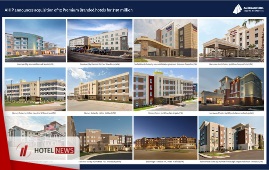
American Hotel Income Properties REIT LP (TSX: HOT.UN, TSX: HOT.U, TSX: HOT.DB.U) announced that it has reached a definitive agreement to acquire a portfolio of 12 well-maintained Premium Branded hotels for $191.0 million excluding closing and post-closing adjustments. The 12 hotels, totaling 1,203 guestrooms, are located across the United States and will significantly strengthen AHIP's geographic presence in Texas and the Midwest. The properties have all been constructed within the past five years, are stabilized and have minimal brand mandated property improvement plans. The transaction is expected to close during December 2019, at which point AHIP's portfolio will consist of 79 Premium Branded hotels, representing 8,887 total guestrooms, that are licensed primarily with Marriott, Hilton and IHG. "We're very excited to complete a significant component of our 2019 capital recycling program by adding these 12 high-quality, mostly all-suite focused, recently built select-service hotels to our portfolio of Premium Branded hotels," said John O'Neill, CEO. "We're especially pleased with the acquisition cap rate and short closing timeline for this transaction, as the cash flow from these newer hotels will minimize the dilution from the sale of the Economy Lodging portfolio. With no major capital renovations required, the hotels in this portfolio should perform without any income displacement. In addition, the improved debt financing terms we've secured for this transaction, including interest only payments at lower fixed interest rates, will meaningfully reduce our financing costs and drive higher cash flows. We continue to believe higher-quality properties and attractive financing terms will drive better risk-adjusted FFO accretion and create value for our unitholders over the long term." AHIP intends to use net proceeds from the sale of its Economy Lodging portfolio, alongside an approximately $105 million new fixed-rate term loan to finance the Acquisition. Specifically, the facility will have a five-year term with fixed interest rates less than 4%, secured by the 12 new hotel properties. Exact debt terms will be confirmed at the time the Acquisition closes. The hotels are being acquired for approximately $158,800 per key, which is below AHIP's estimate of replacement cost. The 12 hotels in the Acquisition include six Marriott branded properties (two Courtyards, two Residence Inns, one Fairfield Inn & Suites and one TownePlace property), five Hilton branded properties (three Home2 Suites, one Hampton Inn and one Homewood Suites), and one IHG branded property (a Staybridge Suites). Eight of the twelve hotels are all-suite products and all of these brands are complementary to AHIP's existing hotel portfolio of select-service, premium branded, upper-midscale to upper-upscale properties. Importantly, all of the properties are already managed by Aimbridge Hospitality – AHIP's exclusive hotel manager, which should ensure a seamless transition into AHIP's portfolio. The Acquisition also further diversifies AHIP's geographic markets, strengthening the Company's presence in markets outside of the U.S. East Coast. Six of the new hotels are located in Texas, while the remainder are located in the Midwest (Michigan, Minnesota, North Dakota and Pennsylvania). In line with AHIP's long-term strategy, all 12 hotels are located in metropolitan secondary markets that benefit from multiple demand generators and industries to support the local economies.
Create: Dec 1, 2019 Edit: Dec 1, 2019 International News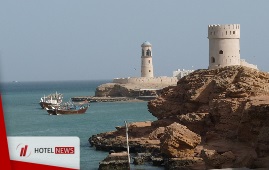
The total revenue of hotels in the three-to-five-star category in Oman has risen by 8%, according to statistics revealed by the National Centre for Statistics and Information. Revenue recorded was OMR155.235 million till the end of September 2019, when compared to OMR143.693 million for the same period last year. According to data, revenue in the month of September alone rose to OMR13.9 million, a 6.2% rise when compared to the same period last year. While the total number of guests recorded until September 2019 were 1.3 million, the month of September recorded 121,000 hotel guests.
Create: Dec 1, 2019 Edit: Dec 1, 2019 International News
Create: Nov 13, 2019 Edit: Jan 26, 2020 TV
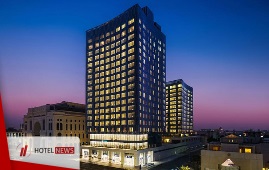
The Assila Hotel features 210 guestrooms Hospitality giant Marriott International will be introducing its Luxury Collection in Jeddah, Saudi Arabia after it signed an agreement with Assila Investments to launch the Assila Hotel. The property is expected to join The Luxury Collection’s portfolio of more than 100 hotels and resorts in 2020. Assila Hotel features 210 guestrooms, including a royal suite, and 94 apartments. It comprises multiple food and beverage venues, including a Café Lounge and Argentinian and Mediterranean specialty restaurants. Speaking about the agreement, Bader Alissa, CEO, Assila Investments said: “We are thrilled to have Marriott International manage the beautiful Assila Hotel, under the Luxury Collection brand. This only affirms Assila Hotel’s position as a premier luxury hotel in Jeddah.” The hotel also includes a ballroom and nine meeting rooms, as well as full-service recreational facilities such as a spa, fitness centre and squash courts. “This deal signing supports our plans to further diversify our footprint in the Kingdom while enhancing our overall luxury portfolio in the region,” Alex Kyriakidis, president and managing director, Middle East & Africa, Marriott International said. The hotel is situated close to planned ‘New Jeddah Downtown’ development, a mixed-used project on Jeddah’s five million square metre waterfront anticipated to launch in 2022.
Create: Oct 12, 2019 Edit: Nov 3, 2019 International News
The cost of applying for an e-visa or a visa on arrival is 440 saudi riyals (around $117) plus VAT. People visiting Saudi Arabia on a tourism visa can now perform Umrah in the kingdom. In addition to that, women will not need to be accompanied by a male relative other than during the Haj season, according to a report by Saudi Gazette. The report also added that through this visa there won’t be a need for a sponsor. On Friday September 27, Saudi Arabia made history with the announcement that tourist visas will be available to citizens from 49 countries. The development is expected to create one million new jobs for the country by 2030. The tourist visa allows for a stay of up to three months per entry, with visitors able to spend up to 90 days per year in the country. The visa is valid for one year with multiple entries.
Create: Oct 1, 2019 Edit: Nov 3, 2019 International News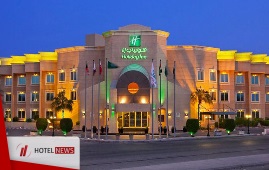
The hospitality group has signed an agreement with real estate company RIKAZ Properties Intercontinental Hotels Group will be developing its fourth Holiday Inn hotel in Al Khobar — Holiday Inn Al Khobar King Fahd Road — after signing a management agreement with real estate company RIKAZ Properties. Expected to open in January 2021, the 140-key property will feature an outdoor pool, a lobby lounge, food & beverage outlets and a gymnasium. Speaking about the new property Pascal Gauvin, MD, India, Middle East & Africa, IHG said, “We are delighted to sign an agreement with RIKAZ Properties for Holiday Inn Al Khobar King Fahd Road and strengthen our mainstream offering in the Kingdom of Saudi Arabia. We have a strong legacy in the Kingdom and are committed to leveraging the growth opportunities that Vision 2030 presents by expanding our presence across the country through our portfolio of global brands. With a number of recent signings in Saudi Arabia, across our brands such as Holiday Inn, voco and Crowne Plaza, we are growing our presence in key cities and gearing up to cater to the needs of diverse guest profiles expected to visit the country in the coming years.”Earlier this year the hospitality group signed two Holiday Inn properties in Madinah and Jeddah. “We are delighted to be partnering with IHG for our new venture. We have witnessed strong tourism figures and hotel occupancy rates in Saudi Arabia. Tourism is a focal point under the government’s vision 2030 - according to MAS (Tourism Research & Information Centre), the number of international trips made to Saudi Arabia is estimated to increase from 18 million in 2015 to 25.8 million in 2020. The Holiday Inn brand has an international appeal and we are confident that this latest hotel will perform successfully and cater to the increasing demand for midscale accommodation in the country,” said Khalid Al Gahtani, Chairman, RIKAZ Properties. IHG currently operates 92 hotels across 7 brands in the Middle East, including: InterContinental, Crowne Plaza, Holiday Inn, Holiday Inn Express, Staybridge Suites, voco and Six Senses Hotels Resorts with a further 41 in the development pipeline due to open within the next three to five years.
Create: Sep 8, 2019 Edit: Sep 14, 2019 International News
Through the acquisition the company is aiming to drive “top-line growth by leveraging dynamic pricing across all its brands” ndia’s Oyo Hotels & Homes has acquired Danamica, a Copenhagen-based data science company, with machine learning and business intelligence capabilities, specialising in dynamic pricing. With this acquisition Oyo is aiming to drive “top-line growth by leveraging dynamic pricing across all its brands”. Commenting on the development, Maninder Gulati, global head, oyo vacation and urban homes, & chief strategy officer, Oyo Hotels & Homes, said, “Danamica, a Europe based, machine learning and business intelligence company specialised in dynamic pricing will help us be more accurate with pricing, leading to higher efficiencies and yield for our real estate owners and value for money for our millions of global guests, both everyday travellers and city dwellers, that choose an Oyo Vacation Homes as their abode.” Last month, the company said it would invest €300 million in the vacation homes business in Europe. The company also signed a partnership valued at Dh18 billion (US$5 billion) with UAE-based IBC Group’s Gallery Suites Vacation Rentals to manage 10,000 premier holiday homes in Dubai.
Create: Sep 8, 2019 Edit: Sep 14, 2019 International News
The hospitality group is attempting to reduce its debt The Indian Hotels Company (IHCL) and its Singapore-based partner GIC have reportedly lined up seven to eight hotel properties for a possible buyout. A few months ago, IHCL created a platform (worth US$600 million) with Singapore-based wealth fund GIC to acquire operational hotels in India’s luxury segment. According to a report by moneycontrol.com, Puneet Chhatwal, IHCL’s MD told analysts that the group is now in the process of identifying a list of seven to eight assets, including “several distressed” ones. Chatwal said that the company was looking forward to be able to announce the buyout of at least one asset within the next three months. The group is currently attempting to reduce its debt that stands at INR1,975 crores (net debt) to less that INR1,000 crore. According to reports, IHCL could even look at its own properties for acquisition but is currently refraining from doing so as the market in India is slow.
Create: Sep 4, 2019 Edit: Sep 5, 2019 International News
National real estate investor and developer Lightstone completed its sixth round of EB-5 investment funding, raising $70 million for the development of the company’s 286-key Marriott Moxy hotel in Manhattan’s East Village. Fundraising is already underway for Miami’s 202-key Moxy South Beach and the 744-key Moxy Downtown Los Angeles—Lightstone’s largest EB-5 funding project. Moxy East Village is set to open this fall. Conceived by Rockwell Group as a vertical timeline, each floor of the hotel draws inspiration from a different era in East Village history. The property will have four new F&B concepts by TAO Group.
Create: Aug 11, 2019 Edit: Aug 21, 2019 International News
